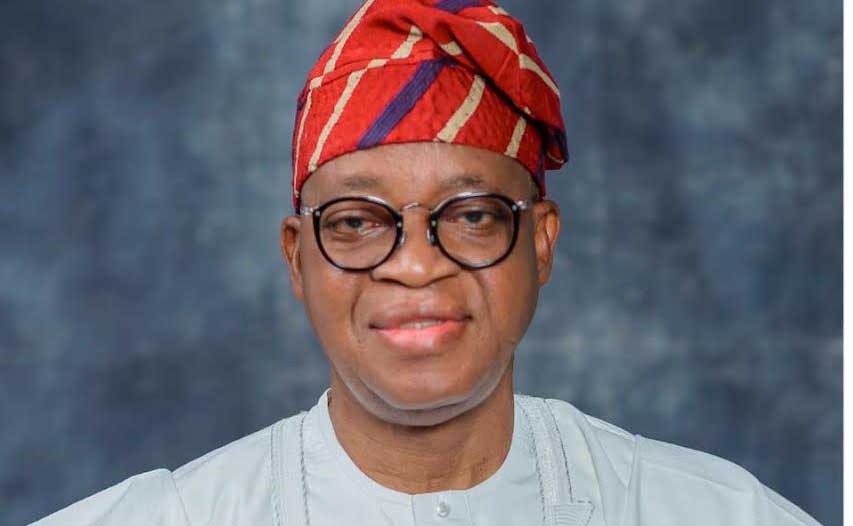The Federal Government, through the Ministry of Marine and Blue Economy, is rallying the organized private sector’s investment to fast track its ongoing seaport modernization project.
The move is to further strengthen the Federal Government’s plans to diversify the nation’s economy from oil and gas to the non oil sector.
It is expected that this will boost its annual Gross Domestic Product (GDP).
Nigeria’s economy expanded by 3.46 percent year-on-year in third quarter 2024, the highest since the fourth quarter of 2023, increasing from 3.19 percent in the previous quarter, according to Trading Economics.
- Mark Ellis’s Pepe Victory Fuels His Ambition to Buy BlockDAG for 30,000x ROI
- Cross River PDP members protest reinstatement of removed chairman
Speaking at a stakeholders’ workshop held in Lagos on Tuesday, the Minister of Marine and Blue Economy, Adegboyega Oyetola, in his keynote speech stated that Nigeria has achieved notable progress in maritime governance, which he said includes the ratification and domestication of international protocols and conventions.
The event is a stakeholders’ engagement and technical validation workshop on the development of national policy on Marine and Blue Economy held in Lagos on Tuesday.
According to him, these measures have strengthened the nation’s safety and security framework, resulting in a remarkable three-year period of zero incidences of piracy in the nation’s waters.
“We are actively seeking private sector investment for port modernisation, which is critical for boosting Nigeria’s competitiveness and attracting sustainable funding for the sector,” Oyetola said.
The Minister further reiterated that all the efforts are integral to ensuring that the policies translate into tangible progress and measurable outcomes.
He lamented that the recurring spate of boat mishaps underscores the pressing need for immediate action on the policy and strategy front.
He pointed out that Nigeria is vigorously pursuing its candidacy for election into Category C of the International Maritime Organization (IMO), “which underscores our determination to strengthen our voice in global maritime governance.”
He reiterated that as the government developed this policy, the ministry remains committed to repositioning Nigeria as a dominant player in the marine and blue economy both regionally and globally.
“A robust national policy will ensure that we address these issues through a comprehensive framework that aligns with international best practices while safeguarding our marine resources for future generations,” Oyetola said.
He highlighted that the national policy which the government seeks to craft must, therefore, be comprehensive to tackle all challenges and unlock the full potential of the sector.
He maintained that the validation workshop is a milestone in an effort to elevate Nigeria’s marine and blue economy.
Oyetola averred that a diligent and inclusive policy-making process underscores the ministry’s commitment to collaboration and precision.
He announced that the ministry has painstakingly developed strategies to guide the sustainable use of the marine resources.
“Our partnerships with the African Union Inter-African Bureau for Animal Resources, the Kingdom of Norway, WorldFish, and other stakeholders have yielded notable strategy and policy documents that are very vital inputs into the National Policy on Marine & Blue Economy,” he explained.
Oyetola explained that the nine-part draft policy presents an elaborate overview of the marine and blue economic endowments of the country and its current state.
He emphasised that the initial consultations and technical drafting processes have produced a draft policy that is both inclusive and forward-looking.
The minister stated that the goal is to critically evaluate the draft policy, ensuring that it addresses the needs of all stakeholders, incorporates global standards, and positions Nigeria as a regional leader in blue economy.
“It affirms our mandate, vision, and mission; which sets the stage for the objectives of the policy and its aspirations.
“It further dissects these aspirations into five broad parts of legal and institutional framework; maritime transport, trade, and shipping; fisheries and aquaculture; marine abiotic resources; and marine innovation and technology,” he said.
“It also identified an array of cross-cutting issues and then concluded with a scan of stakeholders to support the implementation structure. It is comprehensive,” he stated.
Speaking further, Oyetola revealed that the outcome from these stakeholder engagements will be used to update the draft policy and at the end of the process, “we expect to deliver a national policy document that sets out the roadmap to developing our blue economy, creating jobs, promoting private sector investments, and delivering inclusive prosperity to all Nigerians, especially for our youths and women.”
He stated that the blue economy is a transformative pathway for nations seeking to balance economic growth with environmental sustainability.
Oyetola maintained that for Nigeria, with 853 kilometers of coastline, extensive inland waterways, and a vast exclusive economic zone, the marine environment holds unparalleled opportunities in areas of fisheries and aquaculture, shipping and maritime infrastructure, tourism, renewable energy, and seabed mining.
Earlier, the Permanent Secretary, Ministry of Marine and Blue Economy, Olufemi Oloruntola, added that the workshop is a key step in shaping the National Policy on Marine and Blue Economy, “a framework designed to address Nigeria’s specific needs and aspirations while embracing sustainable development principles.”
He added that the workshop provides an opportunity for stakeholders to review, refine, and enrich the draft policy through a participatory and inclusive approach.

 Join Daily Trust WhatsApp Community For Quick Access To News and Happenings Around You.
Join Daily Trust WhatsApp Community For Quick Access To News and Happenings Around You.


